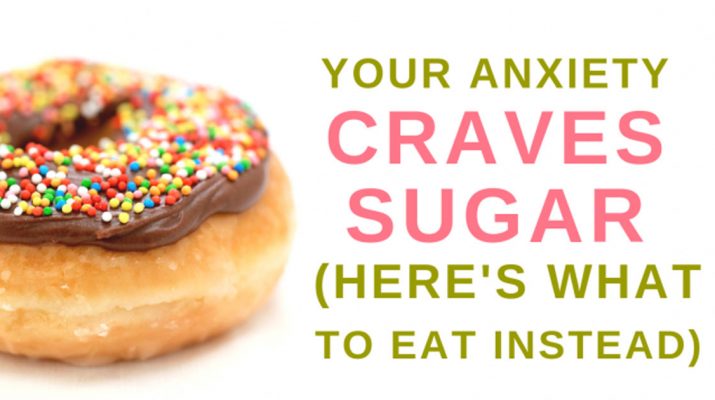Could your go-to comfort foods actually be making your anxiety worse? Here’s what to avoid if you suffer from anxiety – and what to do instead.
Anxiety affects about 40 million Americans each year, making it one of the most common psychiatric conditions in the U.S.
While anti-anxiety pills are often prescribed to help combat this disorder, there are many dietary and lifestyle steps you can take to help you feel better – without any negative side effects. Taking control of your habits plays a much larger role in mental health than you might think.
Let’s take a look at the signs and symptoms of anxiety and then examine why your diet may be playing a significant role in how anxious you feel each day.
What Exactly is Anxiety?
Anxiety is a constant feeling of excessive worry that affects your daily life. You may even avoid certain places or situations that might trigger your anxiety.
People experience anxiety differently and in various degrees of severity. However, here are some of the most common signs and symptoms:
- Constant feelings of restlessness, nervousness, panic or worry
- Rapid heart rate
- Sweating
- Difficulty sleeping
- Weakness
- Digestive issues
How Diet Affects Anxiety
As with every other aspect of health, diet plays a much bigger role in anxiety than you probably think! What you eat can directly affect how you feel mentally.
For example, if you eat a meal high in sugar, you are more likely to experience a blood sugar spike and subsequent crash, which can cause irritability. A diet high in processed and artificial foods can also affect your digestive health, which directly affects your mental health through the gut-brain connection. Poor gut health can lead to certain mental health conditions as studies show that gut inflammation is linked to anxiety and depression.
One of the best ways to support gut health is to eat a balanced and nutrient-dense diet to help support optimal gut bacteria and to help reduce inflammation. Balancing your blood sugar levels can also help control anxiety symptoms while supporting overall health.
7 Ways to Improve Anxiety
To help get your anxiety under control, there are a few simple but very effective dietary changes you can make. The goal is to work towards consuming a well-balanced diet for stable blood sugar levels, optimal gut health, and lessened inflammation – all of which are important for supporting mental health.
1. Cut Back on Sugar
Too much sugar can throw your blood sugar levels out of whack and make you feel anxious. In fact, consuming too much sugar can actually feel like a mild panic attack for some people! Sugar is also inflammatory. While you don’t necessarily need to do a total sugar cleanse, you can cut back on your sugar intake by reading food labels, skipping the sugar cube in your daily cup of coffee or tea, and eating more whole foods.
2. Reduce Caffeine
Just like sugar, caffeine can make you feel on edge and much more anxious due to its stimulant effect on the body. If you find yourself feeling jittery after a cup of coffee, opt for herbal tea like chamomile or green tea instead.
3. Get More Probiotics
Since probiotic-rich foods are so great for digestive health, it’s no wonder they may be able to help reduce anxiety. A study found that fermented foods may actually be able to reduce social anxiety! So, try adding a side of sauerkraut, kimchi or pickles to your plate, and drink up some gut-healing kombucha.
4. Avoid Gluten
More and more people are choosing to eliminate gluten from their diet, and for very good reasons. If you follow a Paleo diet, then you have already cut gluten from your diet, but here’s one more reason to stay far away from it: a study found that the immune response from a gluten sensitivity is linked to certain psychiatric conditions. (7) If you eat gluten and suffer from anxiety, it may be worth removing it from your diet to see how it impacts your mental health.
5. Enjoy More Mood-Boosting Foods
Treat yourself to some mood-boosting foods like raw cacao, blueberries, and avocados. A study found that blueberries had a positive effect on mood in children and young adults, so here’s one more reason to share those delicious berries with the whole family.
6. Eat More Omega-3s
More evidence is pointing to the importance of getting enough omega-3 fatty acids, including a study that found that it helps anxiety conditions. Try adding wild-caught salmon to your diet twice a week, or supplement with high-quality fish oil.
7. Enjoy Foods Rich in B Vitamins
B vitamins have long been used to help support mood and reduce anxiety. Try adding foods like avocados, almonds, and pasture-raised animal products to your diet to make sure you are getting enough B vitamins to help stabilize mood and reduce anxiety.
The Bottom Line
If you suffer from anxiety, don’t underestimate just how powerful diet can be in helping you manage your symptoms. Start by supporting your gut by adding more probiotic-rich foods into your diet, reducing inflammation and stabilizing blood sugar by cutting back on sugar, and steering clear of anxiety-provoking foods and beverages like caffeine and gluten.
With more evidence coming out on the connection between food and mood, start now by taking the steps to support better mental health.

